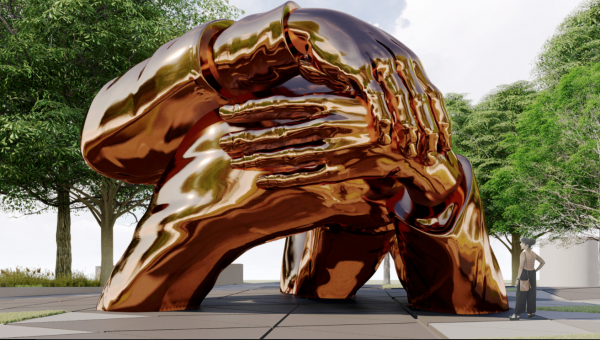September 20, 2018

Titled “The Embrace,” this 22-foot-high sculpture by Hank Willis Thomas working with MASS Design Group was inspired by the idea that protests offer a sense of togetherness, physically and spiritually. “A monument that captures this embrace declares that love is the ultimate weapon against injustice,” their proposal, one of five finalists for the Boston Common site, states. See the other four submissions here.
In a way, Boston is the place where Martin Luther King Jr. accelerated his life’s work as a civil rights leader. The charismatic leader moved to the city in 1951 to study for his doctorate in systematic theology at Boston University, and it was in Boston that he met and quickly fell in love with Coretta Scott while he was solidifying his personal style of leadership.
“This is the first time he sort of stepped outside the limelight of his father, Martin Luther King Sr., a powerful and popular minister based in Atlanta. Boston is where Martin established his identity as a leading thinker, a philosopher and as a religious leader,” said Paul English, the founder of several software companies, including Lola.com and Kayak. English also founded MLK Boston, the nonprofit working with the city of Boston to build and place a memorial on Boston Common honoring the Kings’ love, their time and impact in Boston, and their legacy today.
King studied at BU’s School of Theology between 1951 and 1955. While there, he served as assistant pastor at Twelfth Baptist Church in Roxbury, where he met Scott, who was studying at the New England Conservatory.
By January 1952, King Jr. had dated quite a bit. He wrote in his autobiography that he had started to become cynical because he wasn’t particularly fond of the women he’d met. “He courted lots of women in Boston. I don’t want to say he was a playboy but he was looking for a wife. So he met lots of other women, but Coretta rose beyond them all,” said Rev. Liz Walker, pastor of Roxbury Presbyterian Church, and co-chair of MLK Boston.
Scott’s legacy has long been tethered to his, but she was a force for social justice in her own right. She had grown up in Marion, Alabama, where white neighbors burned her childhood home. Although her father owned land and later a general store, she still faced poverty. “She came up in a really horrible situation concerning race, growing up in Alabama and having to pick cotton and really kind of struggling as a child. Her own sensibility about justice was profound because of her roots,” Walker said.
Before she met King Jr., she had traveled overseas advocating for world peace; she had helped organized Antioch College’s race relations committee; and she was at the time more politically active than King Jr., her biographer wrote.
“When they met he fell in love almost instantly,” Walker said. “She did not, and I love that. So he had to kind of court her.”
Being southerners, the Kings recognized the more progressive attitudes of the North, but also its cloaked racism. He addressed this in a speech at a Ford Hall Forum in Boston in 1963. “The estrangement of the races in the North can be as devastating as the segregation of the South. It is one thing for a white person of good will in the North to rise up with righteous indignation when a bus is burned in Anniston, Alabama, with freedom riders ... but it is just as necessary as important for white persons of good will in the North to rise up with righteous indignation when a negro cannot live in their communities and neighborhoods because of certain restrictions and agreements,” he said.
Later, while still mourning her husband’s death when she took his place at Harvard University’s class day in 1968 — the first woman to do so — Coretta calling on mostly white students to mobilize against injustice. “Your generation must speak out with righteous indignation against forces that are seeking to destroy us,” she told them.
Erecting a memorial to the Kings on the Common ensures they take their rightful place in Boston’s storied history, said English. “If you look at the Freedom Trail and think about who is there, I think Martin Luther King should be honored equally — if not more — as one of the leaders who have come out of Boston.”
Rev. Walker said the memorial is also a call to action — a reminder the Kings’ work is not finished here. “That battle is ongoing. What the Kings stood for is still real. Right now, it’s almost as if their voices are as strong today as they were back — you know — 30, 40, 50 years ago.”
The memorial is only one part of MLK Boston’s plan to honor the Kings. The committee also plans on building an educational center, possibly at the new Dudley Square Library, that will serve as a training ground for local activists. It’s also working on an endowment for MLK-related programming for Twelfth Baptist Church and the commission of a 25-minute documentary about the Kings in Boston.
English said MLK Boston aspires to raise $15 million for the projects. So far, the group has raised about $4.5 million. English said he had donated $1 million, and the Lewis Family Foundation had also given $1 million for the projects.
This segment aired on Sept. 18 on 90.9FM WBUR, Boston’s NPR News Station.



